 The present handbook is an excellent collection of twenty-eight chapters showing different approaches to the pronunciation. The authors of this volume have aimed it mainly for teachers of English language as well as for the linguists; however, this book can also be used for the self-study, i.e. by all people willing to improve their pronunciation and to understand the meanings and forms of it.
Note that the book also includes some chapters considered important in understanding the whole role of correct pronunciation in the analysis and description of the language. The handbook is very timely and useful, taking into account that the pronunciation is something that will never go away and something that influences the spoken language directly. A proper knowledge of English pronunciation is critically important.
Of course, getting to the native-like accent is next to impossible for most adult learners, but still the pronunciation is some sort of gateway to spoken intelligibility, as it is so closely tied to social meanings and helps distinguish the language dialects, informal and formal speech registers etc. Well, we cannot say that this book is an easy-reading, but would still recommend it to the learners of English who really need to significantly improve the pronunciation skills.
 The present training course is primarily aimed at the students of English intending to get a job in the field of oil and gas exploration and production industry, presenting them with the language from a broad variety of the fields and possible situations in the subject industry. The content of the course will help them develop the communication skills and provide the students with the required general background in major industry concepts.
The main topics included in the course are the international oil and gas industry, upstream and downstream, safety matters, exploration. drilling, piping and pipelines, working offshore, natural gas, oil and surrounding environment, various workshop operations, routine maintenance and repair works, the refinery process and equipment, emergency situations, and petrochemicals, i.e. hydrocarbons.
The main content is followed with the instructions to be followed for communication activities, and a set of language tests provided with the keys. It is needless to say that a good technical English is a pre-requisite condition for all workers of the offshore industry; therefore we would definitely recommend this course to anyone with the plans to be a part of the offshore team working on the rigs or involved in the offshore supply or support operations.
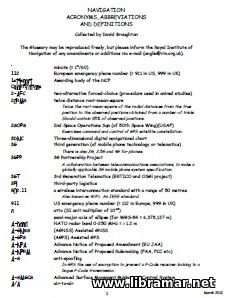 Have a glance in this glossary. It goes without saying that knowledge of marine terminology is critically important for all people working in the maritime industry, including people dealing with the designing the vessels and their construction, trials and further maintenance and operation. No one can perform the duties in any field of shipping industry without being fully aware of the terms used.
This publication was prepared with the ultimate intention of its author, Captain David Broughton, to provide all participants of the maritime industry will an excellent collection of selected terms that they will have to use to perform their duties in a very professional manner. The publication was published by RINA, standing for the Royal Institute of Navigation, one of the most recognized and respected entities in the maritime world. All necessary definitions and abbreviations have been included in this volume, together with the acronyms used in most of the marine literature.
When preparing this glossary, serious considerable research has been undertaken using different reference sources, literature and ships plans, plus all other types of books on the subject. It shall be noted that liberal use has been made of the sketches to informatively and clearly illustrate physical features of sailing vessels as well as nautical technology.
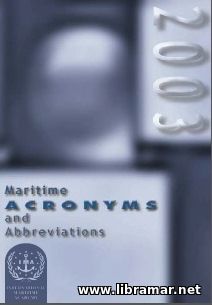 This nice collection of the most popular and frequently used maritime abbreviations and acronyms, prepared and released by the professionals of the Bangladesh IMA (International Maritime Academy), is perfect to be used together with this Maritime Glossary of Terms from the same team of pros.
The publication has been recognized worldwide and is in wide use by all people whose day-to-day job activities involve communicating in English on technical topics or preparing letters or preparation of any other technical documentation.
In addition, the booklet will be very useful to future professionals, i.e. students making their first steps. Needless to say that proper and thorough knowledge of the maritime acronyms is critically important to all participants of the maritime activities, i.e. ship builders, personnel of the shipping companies, crew members, port state control officials, classification society inspector.
It is definitely recommended to anyone who is not necessary the shipping industry professional but intends to improve his or her knowledge of the marine terminology, including the most used abbreviations/acronyms to read the documents, papers or technical publications.
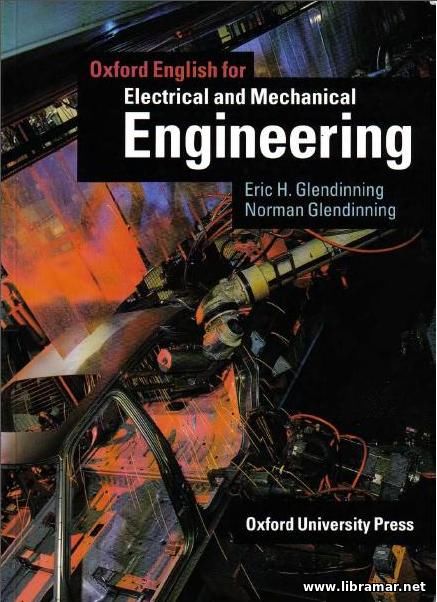 This course of technical English language has been primarily intended to aim the students of Mechanical/Electrical Engineering in technical schools, as well as colleges and universities; it will suit both professional engineers and technicians. This book can also be used for self-study.
The book comprises of thirty units each with authentic exercises from a very wide variety of sources. The topics selected to be included into this book have been chosen by the authors with intention to cover all areas of both Mechanical/Electrical Engineering. The technical contents of the publication includes general engineering matters, training courses, materials and mechanisms, automatic systems, engineering design aspects, robotics, electrical engineering and technology, mechanics - statics and dynamics, pneumatics, hydraulics and fluid mechanics, computer aided design (CAD) and others.
The starting unit of the book is dedicated to the general engineering, while the second unit shows the reader how to choose a course while the next one addresses engineering materials. Then, there are units on mechanisms, forces in engineering, electric motors, central heating, safety matters, latest technological developments etc. We do consider this book a recommended reference source for every engineer regardless of the field.
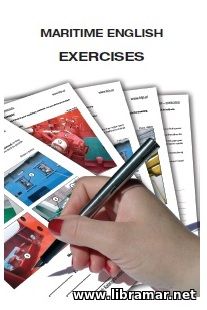 Here is a very good reference source for anyone intending to work on the improvement of his/her knowledge of the maritime English terminology. The numerous exercises included to the book by the authors will be of great help to people trying to reach to the better marine English - the materials provided in the publication cover such the important aspects of general maritime knowledge as ship hull construction, marine engineering, including various ship hull systems, diesel engines, propulsion techniques, cargo gear - cranes, booms, loose gear, and other cargo handling equipment and arrangements, steering systems and equipment, anchoring and mooring arrangements of the vessel, HVAC systems, oily water separators, filtering equipment, tank cleaning systems and inert gas systems (IGS) on tanker vessels.
In addition to that, various aspects of the naval architecture have also been addressed, including load lines, freeboard marking, both intact and damage ship stability, deadweight, lightweight, freight carrying capacity, free surface effect on stability. Then, the navigation equipment has also been covered including the info on GMDSS. Moreover, various life-saving equipment and appliances have also been dealt with, including lifeboats, inflatable and rigid life rafts, rescue boats plus FRC, personal life-saving equipment etc.
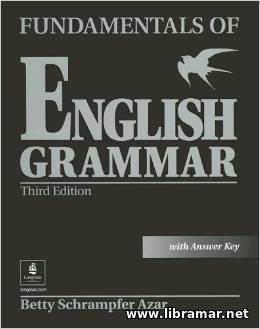 An excellent and classic textbook for those developing their grammar skills - it can be used as a reference book for both classroom training and self-study at home. This third edition of the book features same approach to the material contained in it, as it was the case with first two releases of the book.
The publication by Betty Azar contains many realistic communications, features numerous options for interactive work, so many error-analysis exercises, some fully revised and updated material. Teachers of English found this book very useful because of the way the tenses and other grammar aspects have been explained. There are also so many practical and useful charts on different grammar topics.
This publication is considered by the customers a good review tool for improving ESL grammar skills. In particular, this book would be very highly recommended for the oral practice of various point of English grammar. Note that while most of the grammar books are full of boring exercises, this one goes well beyond that and is therefore much more easy to use and interesting.
All explanations provided in the book are very clear, making the book one of the most popular of the ones available at the market today.
 When I first told friends that I was embarking on a project collecting British dialect, their first thought was often that I would meet a lot of lonely people. I confess I feared they might be right. The speakers whose gems I was looking for were sure to be the last ones standing, bearers of vanishing vocabularies that would never be replaced. For the word 'dialect' has become synonymous with decline, just as English, we are told, is destined to become monolithic, bland, and peppered with universal lines absorbed from TV and Internet chat rooms.
It has been one of the nicest surprises of my career to learn just how wrong we were. That English is far from losing its edge I already knew — its golden age may even lie ahead of us still — but I accepted without question that it was different for dialect. Like most people I know; I believed that our local vocabularies are being ironed out at the same electric pace as new words are being coined, and for a much bigger audience than a particular neighbourhood. That what we now have is a general lexicon from which everyone, north and south, young and old, draws for expression. What I've discovered in the course of writing this book is that dialect is alive, well, and kicking hard. It's just doing so in new and different ways.
Of course, thousands of beautiful and unmistakably local words are dying out; many have already done so. They are just as surely to be missed as the new are to be celebrated. For the most part they belonged to a world now lost to us — one populated with horse-drawn ploughs, dockers and cotton workers, collieries and tin-mines. The lexicons of these and other industries are still there if you look hard enough, but as the need for them diminishes, so do the aural snapshots of the life they once so brilliantly described. Yet, over the 1,500 years of English's history, it was ever thus — words have come and gone (and often come back again) throughout, but the footprints they leave remain as telline as ever...
« 1 2 ... 7 8 9 10 11 12 13 » |







